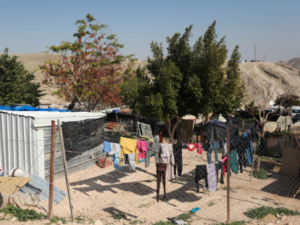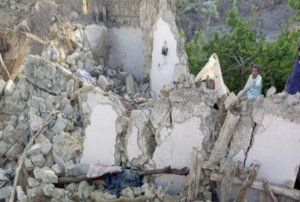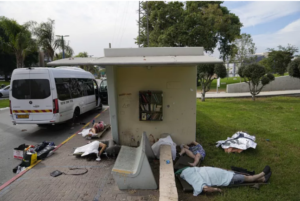
No bomb shelters, no sirens, no Iron Dome: Israel’s long-neglected Arab Bedouins
The shirtless man drops to one knee and begs for his life in Arabic, but he receives no mercy. A Hamas terrorist lifts his boot and lands two blows to the man’s bare torso. Then a second gunman kicks him in the side, followed by a third, propelling him to the ground.

The grim scene unfolded at the kibbutz Re’im on the morning of Oct. 7 and was recorded by a dashboard camera.The victim was Osama Abu Asa, a security guard who watched over stores in the Jewish community 5 miles from the Gaza border. He was pleading in Arabic to the terrorists, for he was an Arab himself — one of thousands of minority tribespeople living in shantytowns in Israel’s Negev desert, essentially trapped between two worlds.
Abu Asa would not survive the morning: His body was later found with bullet wounds to the head and chest, said his brother, Jawad Abu Asa.“Osama was a good man,” Jawad Abu Asa said in an interview, crying as he spoke. “He cared for his family, prayed on time and helped everyone, even the people of Gaza.”
Hamas’ surprise assault killed more than 1,300 people in Israel. The vast majority were Israeli Jews, but the dead also included Obama Abu Asa and at least 14 other Bedouins, some of whom were killed in rocket attacks on their villages.The Bedouins are descendants of Arab nomads who roamed the desert for hundreds of years, herding sheep, goats and camels.
But in the aftermath of the 1948 Arab-Israeli War, most of the Bedouins living in the southern Negev fled the area or were forced out, relocating to Jordan, Syria, the West Bank and Gaza. Israeli authorities concentrated those who remained into a smaller patch of desert and later sought to move them into newly built townships.
But many refused, reluctant to give up their ancient way of life.There are now about 300,000 Bedouins in the Negev.An estimated 100,000 live in villages without electricity, running water and paved roads. Because the villages are not officially recognized by the government, it is illegal for the Bedouins to build permanent homes. They live in small hovels, under constant threat of demolition, in communities that lack rocket sirens, bomb shelters and cover from Israel’s Iron Dome missile defense system.
For decades the Bedouins have sought to have their villages recognized by the Israeli state and provided with basic services, as well as protection from rocket attacks.But their pleas have largely gone unheeded.The Hamas slaughter of Bedouins has laid bare their precarious existence and aggravated long-held grievances against the government.

















Average Rating